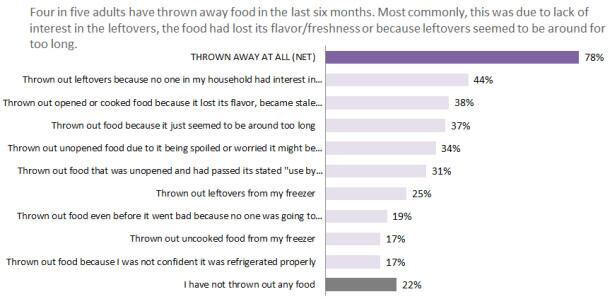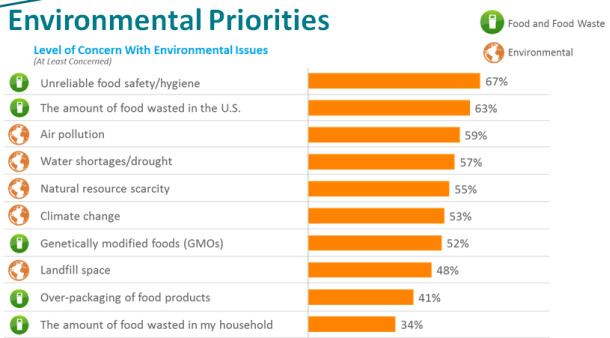Indeed, few are aware that food is the biggest single contributor to landfill (and a huge generator of greenhouse gases such as methane); and that we waste 25% of our fresh water making food that goes in the trash, says packaging giant Sealed Air.
Consumers feel guilty or generally negative about food packaging
The firm, which commissioned a survey of 1,005 main US grocery shoppers in April, found that 63% of consumers felt food waste was a problem in the US, but just 34% believed that their household contributed to the problem.
The survey also found that that consumers regard packaging to be part of the problem, rather than a solution, when it comes to food waste, VP sustainability Ron Cotterman told FoodNavigator-USA.
“Consumers feel guilty or generally negative about food packaging. They don’t realize that it can prevent or reduce waste,” he added, although education can challenge these misconceptions.
“For example, when shown two cucumbers, one unwrapped and one wrapped in plastic, 75% of consumers said they would buy the unwrapped cucumber. But when told the wrapped cucumber has a longer shelf life by two weeks, they reversed that decision.”
Similarly, while individually wrapping portions of poultry might seem wasteful, it means consumers are more likely to cook just what they need, and less likely to throw good food away, he said.
“It’s no good just telling people not to waste food, you have to educate them about how to store food, and help them cook an appropriate amount.”

It’s no good just telling people not to waste food
The food industry has also recognized that it has to get its act together when it comes to date coding on food, which is not standardized across the country, and is a well-documented cause of unnecessary food waste, he added.
Specifically, consumers frequently confuse 'sell by' dates (designed to help retailers manage stock) with expiration dates, while arbitrary ‘best before’ dates are prompting consumers to throw away tons of good food, he added.
The problem is, that while microbiology dictates when a handful of foods may no longer be safe to eat (when ‘use by’ really means something), most shoppers don’t appreciate that the ‘best before’ date on the vast majority of foods is dictated by quality rather than safety, and that they are perfectly safe to eat after this date has been and gone.
“I think addressing this is now a focal point in the food industry because consumers no longer trust their senses the way they used to do in the past,” added Cotterman.
And this is particularly important given that Americans are now buying more fresh and chilled food, he said.
Arbitrary ‘best before’ dates are prompting consumers to throw away good food
Packaging firms, however, have helped consumers reduce wastage on some products such as shredded cheese simply by using re-sealable packaging, he added.
Meanwhile, technologies that extend the life of many chilled products have also reduced waste, he said.
For example, polymer-based materials that not only prevent oxygen getting into vacuum-packed chilled food, but absorb oxygen stored inside the food itself, thereby inhibiting the growth of mold and aerobic microorganisms, have boosted the shelf-life of chilled pasta in particular, he said.
“In the past, even if you used modified atmosphere packaging, spoilage was still a problem because there was oxygen trapped inside the pasta itself. Pasta sucks up oxygen.”
There are also other benefits to this kind of packaging technology in that it can minimize or eliminate the need for preservatives and enable firms to keep their ‘clean label’ credentials and extend shelf life, he added.
While intelligent packaging technologies that show consumers whether or not a food is at its best showed promise, they are not yet sufficiently reliable or widespread to make a big difference to the food waste problem, however, he said.
The top reasons shoppers surveyed by Sealed Air cite for throwing food away are because:
- They have lost interest in the food in question (44%)
- It has lost its flavor or freshness (38%)
- It seemed to be around too long (37%)
- It's spoiled or they are worried about it being spoiled (34%)
- It has passed its use by date (31%)

